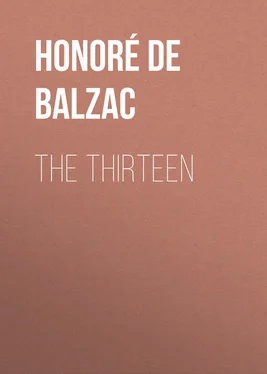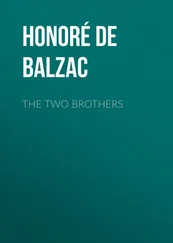Honoré Balzac - The Thirteen
Здесь есть возможность читать онлайн «Honoré Balzac - The Thirteen» — ознакомительный отрывок электронной книги совершенно бесплатно, а после прочтения отрывка купить полную версию. В некоторых случаях можно слушать аудио, скачать через торрент в формате fb2 и присутствует краткое содержание. Жанр: literature_19, foreign_antique, foreign_prose, на английском языке. Описание произведения, (предисловие) а так же отзывы посетителей доступны на портале библиотеки ЛибКат.
- Название:The Thirteen
- Автор:
- Жанр:
- Год:неизвестен
- ISBN:нет данных
- Рейтинг книги:3 / 5. Голосов: 1
-
Избранное:Добавить в избранное
- Отзывы:
-
Ваша оценка:
- 60
- 1
- 2
- 3
- 4
- 5
The Thirteen: краткое содержание, описание и аннотация
Предлагаем к чтению аннотацию, описание, краткое содержание или предисловие (зависит от того, что написал сам автор книги «The Thirteen»). Если вы не нашли необходимую информацию о книге — напишите в комментариях, мы постараемся отыскать её.
The Thirteen — читать онлайн ознакомительный отрывок
Ниже представлен текст книги, разбитый по страницам. Система сохранения места последней прочитанной страницы, позволяет с удобством читать онлайн бесплатно книгу «The Thirteen», без необходимости каждый раз заново искать на чём Вы остановились. Поставьте закладку, и сможете в любой момент перейти на страницу, на которой закончили чтение.
Интервал:
Закладка:
George Saintsbury
AUTHOR’S PREFACE
In the Paris of the Empire there were found Thirteen men equally impressed with the same idea, equally endowed with energy enough to keep them true to it, while among themselves they were loyal enough to keep faith even when their interests seemed to clash. They were strong enough to set themselves above all laws; bold enough to shrink from no enterprise; and lucky enough to succeed in nearly everything that they undertook. So profoundly politic were they, that they could dissemble the tie which bound them together. They ran the greatest risks, and kept their failures to themselves. Fear never entered into their calculations; not one of them had trembled before princes, before the executioner’s axe, before innocence. They had taken each other as they were, regardless of social prejudices. Criminals they doubtless were, yet none the less were they all remarkable for some one of the virtues which go to the making of great men, and their numbers were filled up only from among picked recruits. Finally, that nothing should be lacking to complete the dark, mysterious romance of their history, nobody to this day knows who they were. The Thirteen once realized all the wildest ideas conjured up by tales of the occult powers of a Manfred, a Faust, or a Melmoth; and to-day the band is broken up or, at any rate, dispersed. Its members have quietly returned beneath the yoke of the Civil Code; much as Morgan, the Achilles of piracy, gave up buccaneering to be a peaceable planter; and, untroubled by qualms of conscience, sat himself down by the fireside to dispose of blood-stained booty acquired by the red light of blazing towns.
After Napoleon’s death, the band was dissolved by a chance event which the author is bound for the present to pass over in silence, and its mysterious existence, as curious, it may be, as the darkest novel by Mrs. Radcliffe, came to an end.
It was only lately that the present writer, detecting, as he fancied, a faint desire for celebrity in one of the anonymous heroes to whom the whole band once owed an occult allegiance, received the somewhat singular permission to make public certain of the adventures which befell that band, provided that, while telling the story in his own fashion, he observed certain limits.
The aforesaid leader was still an apparently young man with fair hair and blue eyes, and a soft, thin voice which might seem to indicate a feminine temperament. His face was pale, his ways mysterious. He chatted pleasantly, and told me that he was only just turned of forty. He might have belonged to any one of the upper classes. The name which he gave was probably assumed, and no one answering to his description was known in society. Who is he, do you ask? No one knows.
Perhaps when he made his extraordinary disclosures to the present writer, he wished to see them in some sort reproduced; to enjoy the effect of the sensation on the multitude; to feel as Macpherson might have felt when the name of Ossian, his creation, passed into all languages. And, in truth, that Scottish advocate knew one of the keenest, or, at any rate, one of the rarest sensations in human experience. What was this but the incognito of genius? To write an Itineraire de Paris a Jerusalem is to take one’s share in the glory of a century, but to give a Homer to one’s country – this surely is a usurpation of the rights of God.
The writer is too well acquainted with the laws of narration to be unaware of the nature of the pledge given by this brief preface; but, at the same time, he knows enough of the history of the Thirteen to feel confident that he shall not disappoint any expectations raised by the programme. Tragedies dripping with gore, comedies piled up with horrors, tales of heads taken off in secret have been confided to him. If any reader has not had enough of the ghastly tales served up to the public for some time past, he has only to express his wish; the author is in a position to reveal cold-blooded atrocities and family secrets of a gloomy and astonishing nature. But in preference he has chosen those pleasanter stories in which stormy passions are succeeded by purer scenes, where the beauty and goodness of woman shine out the brighter for the darkness. And, to the honor of the Thirteen, such episodes as these are not wanting. Some day perhaps it may be thought worth while to give their whole history to the world; in which case it might form a pendant to the history of the buccaneers – that race apart so curiously energetic, so attractive in spite of their crimes.
When a writer has a true story to tell, he should scorn to turn it into a sort of puzzle toy, after the manner of those novelists who take their reader for a walk through one cavern after another to show him a dried-up corpse at the end of the fourth volume, and inform him, by way of conclusion, that he has been frightened all along by a door hidden somewhere or other behind some tapestry; or a dead body, left by inadvertence, under the floor. So the present chronicler, in spite of his objection to prefaces, felt bound to introduce his fragment by a few remarks.
Ferragus , the first episode, is connected by invisible links with the history of the Thirteen, for the power which they acquired in a natural manner provides the apparently supernatural machinery.
Again, although a certain literary coquetry may be permissible to retailers of the marvelous, the sober chronicler is bound to forego such advantage as he may reap from an odd-sounding name, on which many ephemeral successes are founded in these days. Wherefore the present writer gives the following succinct statement of the reasons which induced him to adopt the unlikely sounding title and sub-title.
In accordance with old-established custom, Ferragus is a name taken by the head of a guild of Devorants , id est Devoirants or journeymen. Every chief on the day of his election chooses a pseudonym and continues a dynasty of Devorants precisely as a pope changes his name on his accession to the triple tiara; and as the Church has its Clement XIV., Gregory XII., Julius II., or Alexander VI., so the workmen have their Trempe-la-Soupe IX., Ferragus XXII., Tutanus XIII., or Masche-Fer IV. Who are the Devorants , do you ask?
The Devorants are one among many tribes of compagnons whose origin can be traced to a great mystical association formed among the workmen of Christendom for the rebuilding of the Temple at Jerusalem. Compagnonnage is still a popular institution in France. Its traditions still exert a power over little enlightened minds, over men so uneducated that they have not learned to break their oaths; and the various organizations might be turned to formidable account even yet if any rough-hewn man of genius arose to make use of them, for his instruments would be, for the most part, almost blind.
Wherever journeymen travel, they find a hostel for compagnons which has been in existence in the town from time immemorial. The obade , as they call it, is a kind of lodge with a “Mother” in charge, an old, half-gypsy wife who has nothing to lose. She hears all that goes on in the countryside; and, either from fear or from long habit, is devoted to the interests of the tribe boarded and lodged by her. And as a result, this shifting population, subject as it is to an unalterable law of custom, has eyes in every place, and will carry out an order anywhere without asking questions; for the oldest journeyman is still at an age when a man has some beliefs left. What is more, the whole fraternity professes doctrines which, if unfolded never so little, are both true enough and mysterious enough to electrify all the adepts with patriotism; and the compagnons are so attached to their rules, that there have been bloody battles between different fraternities on a question of principle. Fortunately, however, for peace and public order; if a Devorant is ambitious, he takes to building houses, makes a fortune, and leaves the guild.
Читать дальшеИнтервал:
Закладка:
Похожие книги на «The Thirteen»
Представляем Вашему вниманию похожие книги на «The Thirteen» списком для выбора. Мы отобрали схожую по названию и смыслу литературу в надежде предоставить читателям больше вариантов отыскать новые, интересные, ещё непрочитанные произведения.
Обсуждение, отзывы о книге «The Thirteen» и просто собственные мнения читателей. Оставьте ваши комментарии, напишите, что Вы думаете о произведении, его смысле или главных героях. Укажите что конкретно понравилось, а что нет, и почему Вы так считаете.












